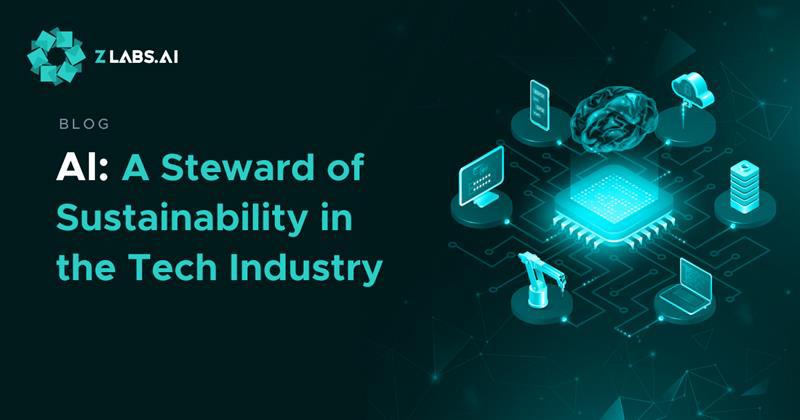AI for Sustainability: Data Analysis in the Tech Industry | ZLabs
Artificial Intelligence (AI) is no longer just a computational tool, it is also emerging as an environmental steward in the tech industry. This piece aims to elucidate the role of AI in fostering sustainability, reducing carbon footprints, and promoting a circular economy. Join us as we explore how AI, a cornerstone of modern technology, is revolutionizing our approach towards environmental responsibility.

AI - The New Frontier in Sustainability
The convergence of AI with the sustainability narrative has arrived at a crucial juncture in our technological journey. According to the World Economic Forum, by 2030, AI could contribute to a 1.5% decrease in global greenhouse gas emissions from the 1990 levels. This technology could also generate an economic value of $15.7 trillion by the same year. Thus, AI is emerging as a vital catalyst in driving sustainability in the tech sector.

Practical Applications of AI - Fostering Green Innovations
Between 2017 and 2019, the World Intellectual Property Organization (WIPO) reported a 34% increase in AI patent applications relating to sustainability. This rise indicates the potential of AI in advancing energy efficiency, reducing e-waste, and refining resource optimization across the tech industry. Consider Google's DeepMind, which decreased the energy utilized for cooling its data centers by 40%, or IBM's 'Green Horizon Project', which improved Beijing's air quality forecast accuracy by 30%.

The Business Case for AI-Driven Sustainability
An AccentureStrategy report highlights the impressive returns on investment from AI-driven sustainability initiatives. The study reveals that businesses deploying AI for sustainable practices could improve their profitability by up to 38%. They also have the potential to generate 2.3 times the revenue of less progressive counterparts. Examples like Microsoft and Amazon demonstrate the benefits of such practices, including substantial cost savings, efficiency gains, and reputation enhancement.
Steering Towards a Circular Economy - AI at the Helm
AI plays a critical role in leading the tech industry towards a circular economy where resources are continuously used, recovered, and regenerated. For instance, Apple leveraged AI-driven high-speed sorting mechanisms to recycle 2.2 million pounds of electronic waste in 2019. Intel's AI algorithms have optimized energy usage across their factories, saving 140 million kilowatt-hours of energy from 2012 to 2020.
Overcoming Implementation Challenges in AI-driven Sustainability
Despite its immense potential, implementing AI for sustainability comes with challenges, including ethical considerations and balancing technological advancements with environmental impacts. Strategies like Accenture's 'Responsible AI' offer potential solutions by focusing on fundamental principles such as fairness, transparency, robustness, security, and accountability.
Glimpses of the Future - Harnessing Emerging AI Technologies
Looking ahead, AI technologies are poised to supercharge sustainability. For example, AI-powered grid optimization technologies could revolutionize energy distribution, while AI-led predictive maintenance could drastically reduce machine downtime and waste.
Learning from the Leaders - Case Studies in AI-Driven Sustainability
IBM's 'Green Horizon Project' and Google's DeepMind serve as inspiring case studies in AI-driven sustainability. Their innovative strategies, comprehensive implementation processes, and impressive outcomes provide valuable blueprints for tech leaders looking to embrace sustainable practices.
Actionable Steps for Tech Leaders
For tech leaders aiming to employ AI for sustainable practices, the first step is creating a clear vision for AI-driven sustainability. This should be followed by fostering an innovation culture, investing in AI research, ensuring transparency in AI usage, and effectively navigating regulations and policies surrounding AI and sustainability.
Conclusion: The Convergence of AI and Sustainability
AI is redefining the future of the tech industry with its extraordinary potential in optimizing resource usage and reducing carbon footprints. As tech industry leaders, it is our responsibility to harness this revolutionary technology and promote a harmonious integration of technology and sustainability.
Key Takeaways
- AI is predicted to contribute to a 1.5% decrease in global greenhouse gas emissions from 1990 levels by 2030.
- There has been a 34% increase in AI patent applications related to sustainability between 2017 and 2019.
- Businesses utilizing AI for sustainability could enhance their profitability by up to 38% and generate 2.3 times the revenue of their less progressive peers.
- AI is key to transitioning to a circular economy in tech, with significant impacts on waste management and energy efficiency.
- Future enhancements in sustainability will be driven by AI technologies such as grid optimization and predictive maintenance.